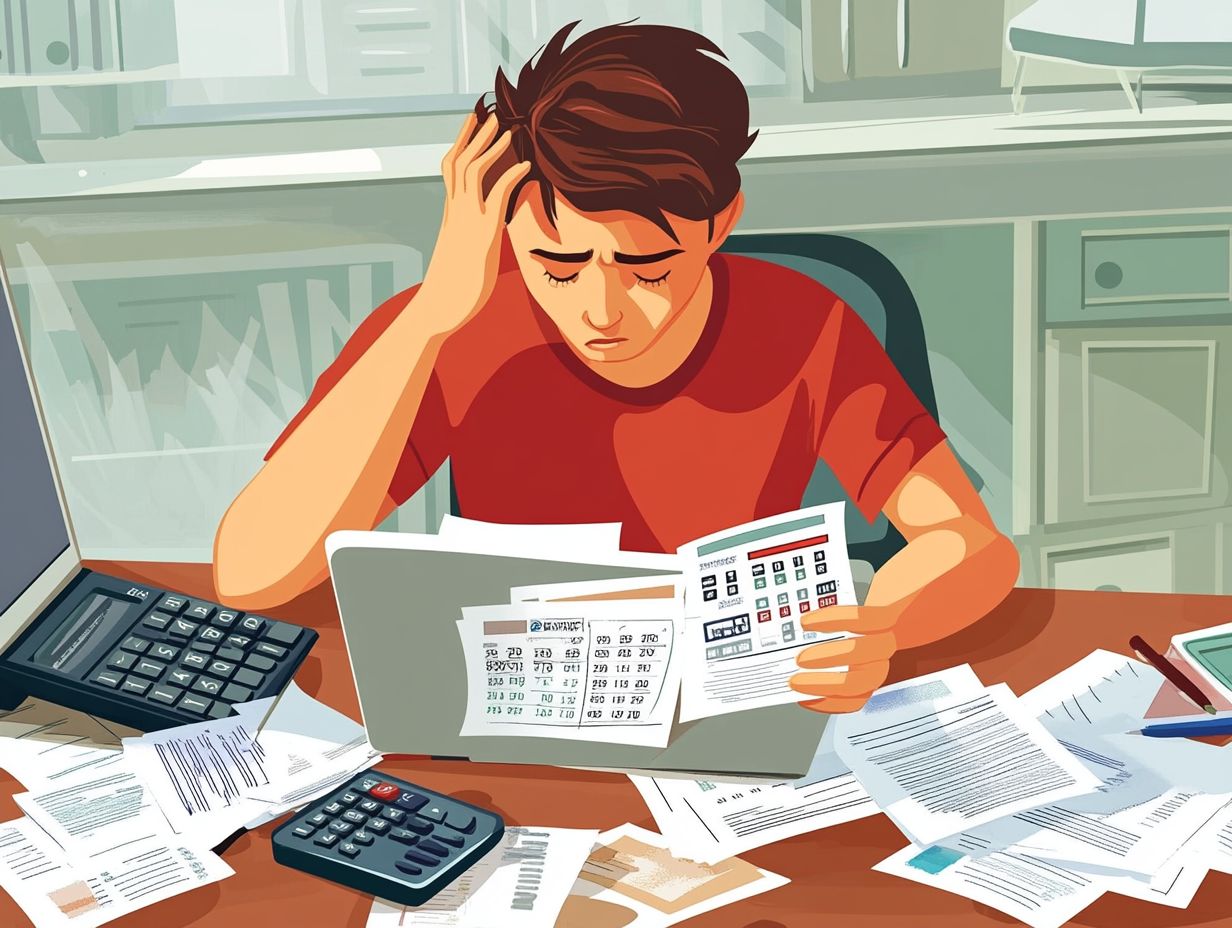6 Signs You Need to Improve Your Credit Score
Your credit score is a vital component of your financial well-being. It impacts everything from loan approvals to the interest rates you receive.
If you’ve recently faced setbacks like being denied credit or receiving unwelcome calls from collection agencies it may be time to take a closer look at your score.
This guide highlights six clear signs that indicate your credit score requires attention. It also explains how credit scores are calculated, defines what constitutes a good score, and outlines practical steps you can take to enhance yours.
Whether you’re aiming to secure a mortgage or simply wish to elevate your financial standing, you’ll find the insights you need right here.
Contents
- Key Takeaways:
- 1. You Have Been Denied Credit or Loans
- 2. You Have High Interest Rates on Loans or Credit Cards
- 3. You Are Unable to Get Approved for a Mortgage
- 4. Are Your Credit Card Balances Rising?
- 5. You Have a High Debt-to-Income Ratio
- 6. Are You Receiving Calls from Collection Agencies?
- How Is a Credit Score Calculated?
- Frequently Asked Questions
- What are the 6 signs that I need to improve my credit score?
- How can a low credit score affect me?
- What should I do if I have missed payments on my credit accounts?
- What s a High Credit Utilization Ratio, and Why Does It Matter?
- Is it possible to improve my credit score quickly?
- Why is it important to regularly check my credit report?
Key Takeaways:

- Being denied credit or loans clearly indicates that your credit score needs improvement.
- High interest rates on loans and credit cards suggest a low credit score and the need for improvement.
- Not being approved for a mortgage is a major sign that your credit score needs to be higher.
1. You Have Been Denied Credit or Loans
Being denied credit or loans can be incredibly frustrating. Often, this situation arises from a low credit score reflected in your credit report, which is meticulously maintained by major credit bureaus like Equifax, Experian, and TransUnion.
Your credit score reflects various factors, such as payment history, debt balances, and the amount of credit you are using compared to your total available credit. Understanding the ramifications of a poor credit score is crucial.
A low score not only hinders your ability to secure loans but can also dictate the interest rates and terms attached to any loans you might qualify for. Your score, commonly known as a FICO score, serves as a snapshot of your creditworthiness.
Regularly reviewing your credit report allows you to uncover any inaccuracies or negative marks that may be adversely affecting your score. If you re looking to enhance your financial standing, consider these steps:
- Check your reports for errors.
- Pay down outstanding debts.
- Be proactive in maintaining a good credit history.
Credit bureaus play an essential role as they compile and analyze credit data, enabling lenders to make informed decisions.
2. You Have High Interest Rates on Loans or Credit Cards
High interest rates on loans or credit cards can heavily impact your finances. These rates often stem from a less-than-stellar credit score due to high credit utilization and a history of missed payments.
Several factors influence these rates, including the overall economic climate, the central bank’s monetary policy, and most importantly, your creditworthiness, which is closely linked to your credit score.
A higher credit score generally means lower interest rates, allowing you to save money over time. It s essential to keep your credit utilization ratio low ideally below 30% as this demonstrates responsible credit management and can enhance your score.
Additionally, leveraging credit monitoring services can provide you with weekly insights into your credit health. This enables you to pinpoint areas for improvement and steer clear of potential pitfalls. Taking a proactive approach lays the groundwork for securing better rates in the future.
3. You Are Unable to Get Approved for a Mortgage
Struggling to get approved for a mortgage can feel incredibly disheartening. This situation often stems from a low credit score that reflects negative payment history and outstanding debt balances.
Mortgage lenders typically look for a credit score of at least 620. However, aiming for a higher score can unlock better interest rates and more favorable terms. A solid payment history is crucial; consistent on-time payments demonstrate your reliability and financial responsibility.
On the flip side, carrying significant debt can diminish your chances of approval and raise red flags for lenders. To enhance your credit score, focus on paying down existing debts, making payments punctually, and regularly reviewing your credit reports for any inaccuracies.
By taking these steps, you can lay the groundwork for securing that dream home financing and enjoy a more seamless mortgage application process.
4. Are Your Credit Card Balances Rising?
If you re noticing that your credit card balances are creeping up, it might be a sign of poor credit utilization practices. This can adversely affect your credit score and overall financial health.
Understanding this issue is essential for anyone striving to maintain financial stability. The key is to manage your balances effectively and ensure your credit utilization ratio the percentage of your available credit that you’re using is ideally below 30%. This supports a positive credit profile.
Create personalized payment plans to tackle higher-interest debt first, making your repayment efforts more efficient. Wise budgeting and setting aside a portion of your monthly income specifically for credit card payments can help you avoid the traps of excessive debt.
By embracing these strategies, you can enhance your credit standing while building long-term financial resilience.
5. You Have a High Debt-to-Income Ratio

A high debt-to-income ratio the percentage of your income that goes toward paying debts can significantly impact your ability to secure loans and may tarnish your credit score. It often indicates financial strain and poor management of credit accounts.
This ratio is calculated by dividing your total monthly debt payments by your gross monthly income. This provides lenders with a clear picture of your financial obligations relative to your earnings. When this number is elevated, it signals a higher risk for lenders, potentially resulting in denied applications or higher interest rates. Ideally, you want this ratio to be below 36%.
To improve your situation, consider adopting strategies such as:
- Consolidate debt
- Create a budget to prioritize repayment
- Negotiate terms with creditors to lower your monthly payments
Implementing these strategies can boost your creditworthiness over time.
6. Are You Receiving Calls from Collection Agencies?
Receiving calls from collection agencies can be a distressing experience. It often signals that negative information about unpaid debts has surfaced on your credit report.
These calls typically arise from missed payments on loans, credit cards, or medical bills. This understandably triggers significant anxiety. When you receive such notifications, remember that these agencies are attempting to recover funds on behalf of creditors.
Unresolved debts can lead to a drop in your credit score, complicating future financial pursuits, such as securing a loan or renting an apartment. If you suspect identity theft, act now! Contact credit bureaus immediately to freeze your accounts and meticulously review your credit reports for any unauthorized activity.
Maintaining clear communication with collectors is vital. Let them know your intentions or any disputes regarding the debt. If incorrect information appears on your credit report, understanding the dispute process can help you rectify these inaccuracies promptly.
How Is a Credit Score Calculated?
A credit score is determined by various factors, including your payment history, credit utilization, and the length of your credit history. Among these, FICO scores stand out as one of the most commonly used models by lenders when assessing your creditworthiness.
These elements shape your score and reflect the overall health of your financial profile. Your payment history holds the most weight, indicating how reliably you meet your obligations on time. Credit utilization how much credit you re using compared to your total available credit also carries considerable significance. Keeping this ratio below 30% is generally wise.
It’s fascinating to observe that different credit bureaus, such as Experian and TransUnion, may interpret these factors differently, resulting in variations in your scores. To boost your credit score, focus on making timely payments, keeping your credit card balances low, and regularly reviewing your credit reports for inaccuracies.
Take charge of your credit health today!
What Is Considered a Good Credit Score?
A good credit score typically falls within the range of 700 to 749, signaling to lenders that you are a responsible borrower.
This indicates you are less likely to default on loans, based on the system used to measure creditworthiness.
Achieving a good credit score is essential for unlocking a myriad of financial opportunities. When you maintain a score within this range, you can enjoy lower interest rates on mortgages and personal loans. This can lead to significant savings over time.
A strong credit profile not only enhances your chances of securing loan approvals but also positions you favorably in negotiations with creditors.
Good credit cultivates a sense of security and financial well-being. It opens doors to better insurance rates and rental agreements, ultimately solidifying your overall economic standing.
What Are the Consequences of Having a Low Credit Score?
A low credit score can lead to a host of negative consequences for you, such as higher interest rates on loans and challenges in obtaining credit.
You may even face potential denials on credit applications. This situation can put you in a precarious financial position.
Landlords may view potential tenants with low credit scores as high-risk candidates, significantly limiting your housing opportunities.
However, you can take proactive steps to improve your credit score. Regularly reviewing your credit reports for inaccuracies and ensuring timely payment of your bills can contribute to a more favorable credit profile.
Additionally, collaborating with a credit counselor or using credit-building tools can jumpstart your journey to better financial health today!
What Are the Steps to Improving a Credit Score?

To enhance your credit score, it s crucial to concentrate on several key actions: timely payments, reducing credit utilization, and monitoring your credit report for errors.
By prioritizing these factors, you can effectively improve your financial standing. One practical approach is to set up automatic payments for bills to ensure you consistently meet deadlines.
Tackling high-interest debts first can significantly reduce your overall balances, giving you better control over your available credit.
Consider utilizing credit monitoring services; they offer valuable insights into changes in your credit score and alert you to potential inaccuracies.
Additionally, regularly reviewing your credit report for discrepancies is an essential habit. This allows you to dispute and correct errors that could adversely affect your score, ensuring you maintain a robust financial profile.
How Long Does It Take to Improve a Credit Score?
The time it takes to improve your credit score can vary greatly depending on your unique financial situation. However, with consistent effort and wise financial management, you could see noticeable improvements within just a few months.
Several factors come into play when it comes to the timeline for improvement, including the current state of your credit history and the strategies you choose to implement.
If you have a history of late payments, your path to seeing positive changes may be longer compared to someone who consistently pays on time.
The effectiveness of your payment plans, like debt consolidation combining multiple debts into a single loan to lower interest rates also plays a critical role in speeding up your credit score recovery.
It s important to set realistic expectations; while some individuals may experience a boost in their scores shortly after adopting better habits, others might find that a longer commitment is necessary to witness substantial progress.
Understanding these dynamics can truly enable you on your journey to financial health.
Start improving your credit score today and unlock better financial opportunities!
What Are Some Common Mistakes That Can Hurt a Credit Score?
Common mistakes that can harm your credit score include missing payments, racking up high debt balances, and neglecting to check for errors on your credit report.
Applying for multiple credit accounts in a short period can raise red flags and suggest you might have money problems. This could lead to a significant drop in your credit score. Avoid closing old credit accounts because it can reduce the average age of your credit history, which is crucial for credit scoring.
Additionally, avoid maxing out your credit cards, as high utilization ratios can negatively affect how lenders view your creditworthiness.
To maintain a healthy credit score, prioritize these actions:
- Timely payments
- Monitoring your credit utilization
- Regularly reviewing your credit reports for inaccuracies
- Limiting new account applications over time
Frequently Asked Questions
What are the 6 signs that I need to improve my credit score?
The 6 signs that indicate you need to improve your credit score include a low credit score, missed payments, high credit utilization, high levels of debt, recent credit applications, and errors on your credit report.
How can a low credit score affect me?
A low credit score can make it hard to get approved for loans and credit cards, result in higher interest rates and fees, and even lead to being denied rental or job opportunities.
What should I do if I have missed payments on my credit accounts?
If you have missed payments, it s crucial to catch up quickly and continue making timely payments. Your payment history accounts for a significant portion of your credit score, so consistent on-time payments can help improve it.
What s a High Credit Utilization Ratio, and Why Does It Matter?
A credit utilization ratio compares the amount of credit you use to your total credit limit. A high ratio, typically over 30%, can negatively impact your credit score because it may indicate you’re relying too heavily on credit.
Is it possible to improve my credit score quickly?
No, improving your credit score takes time and consistent effort. However, by paying bills on time, reducing your debt, and checking your credit report for errors, you can gradually enhance your score.
Why is it important to regularly check my credit report?
Regularly checking your credit report helps identify errors or fraudulent activity that may be affecting your score. By catching and addressing these issues early, you can prevent further damage to your credit score.
Start checking your credit report today to stay informed!







